
Swallowtail butterflies are large, colorful butterflies in the family Papilionidae, and include over 550 species. Though the majority are tropical, members of the family inhabit every continent except Antarctica. The family includes the largest butterflies in the world, the birdwing butterflies of the genus Ornithoptera.

Byasa dasarada, the great windmill, is a butterfly found in India that belongs to the windmills genus, Byasa, comprising tailed black swallowtail butterflies with white spots and red submarginal crescents.
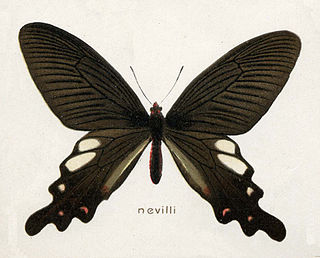
Byasa nevilli, the Nevill's windmill, is a butterfly found in India that belongs to the windmills genus (Byasa), comprising tailed black swallowtail butterflies with white spots and red submarginal crescents.
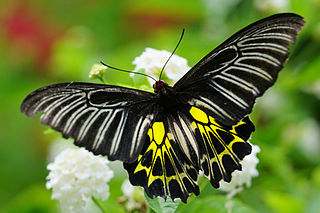
Troides aeacus, the golden birdwing, is a large tropical butterfly belonging to the swallowtail family, Papilionidae.

Losaria rhodifer, the Andaman clubtail, is a rare species of the swallowtail family, Papilionidae, native to India. The butterfly belongs to the genus Losaria, or the clubtails, as they are commonly known.
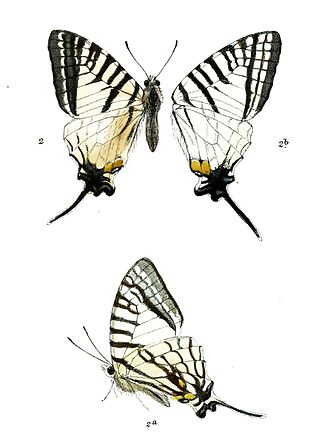
Graphium eurous, the sixbar swordtail, is a swallowtail butterfly belonging to the genus Graphium, also known as the swordtails.
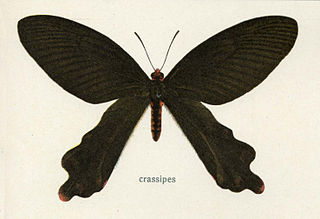
Byasa crassipes, the black windmill, is a butterfly found in India and Southeast Asia that belongs to the windmills genus, Byasa, comprising tailed black swallowtail butterflies with white spots and red submarginal crescents.

Parnassius stoliczkanus, the Ladakh banded Apollo, is a rare high-altitude butterfly which is found in Central Asia. It is a member of the snow Apollo genus (Parnassius) of the swallowtail family. It is named after the naturalist and explorer Ferdinand Stoliczka.

Parnassius delphius, the banded Apollo, is a high-altitude butterfly which is found in Central Asia. It is a member of the genus Parnassius of the swallowtail family, Papilionidae.

Parnassius acdestis is a high-altitude butterfly found in India. It is a member of the genus Parnassius of the swallowtail family, Papilionidae. The species was first described by Grigory Grum-Grshimailo in 1891.

Parnassius charltonius, the regal Apollo, is a high-altitude butterfly which is found in India. It is a member of the snow Apollo genus (Parnassius) of the swallowtail family (Papilionidae). This handsome butterfly is found at altitudes from 9,000 to 13,000 feet from Chitral to Kumaon.

Parnassius acco, the varnished Apollo, is a high-altitude butterfly found in Asia. It is a member of the snow Apollo genus Parnassius of the swallowtail family, Papilionidae.

Parnassius hannyngtoni, the Hannyngton's Apollo, is a high-altitude butterfly which is found in India. It is a member of the snow Apollo genus (Parnassius) of the swallowtail family (Papilionidae). Some sources also spell the name as P. hunnygtoni. It is named after Frank Hannyngton who obtained the specimen from the Chumbi Valley.

Parnassius simo, the black-edged Apollo, is a high-altitude butterfly found in the Himalayas which belongs to the Papilionidae (swallowtail) family.

Parnassius epaphus, the common red Apollo, is a high altitude butterfly which is found in India and Nepal. It is a member of the snow Apollo genus (Parnassius) of the swallowtail family (Papilionidae). It is found from 9,000 to 13,000 feet from Chitral District to Sikkim and western regions of Nepal. It is not considered rare.

Parnassius actius, also known as the scarce red apollo, is a high-altitude butterfly found in Central Asia. It is a member of the snow Apollo genus (Parnassius) of the swallowtail family (Papilionidae).
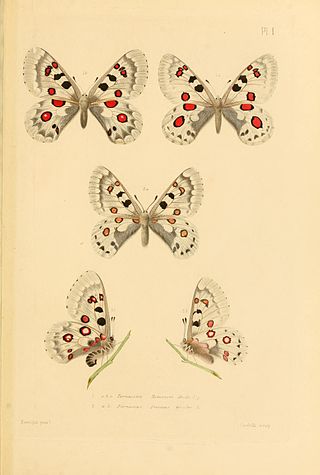
Parnassius tianschanicus, the large keeled Apollo, is a high-altitude butterfly. It is a member of the snow Apollo genus (Parnassius) of the swallowtail family, Papilionidae.

Parnassius staudingeri hunza, the Karakoram banded Apollo, is a high-altitude butterfly which is found in India. It is a member of the genus Parnassius of the swallowtail family, Papilionidae. It was variously treated as a subspecies of P. delphius and a distinct species. The subspecies was first described by Grigory Grum-Grshimailo in 1888.

Parnassius is a genus of northern circumpolar and montane butterflies usually known as Apollos or snow Apollos. They can vary in colour and form significantly based on their altitude. They also exhibit altitudinal melananism, a high-altitude adaptation. They have dark bodies and darker coloring at the base of their wings, which allows them to absorb solar energy more quickly.



















